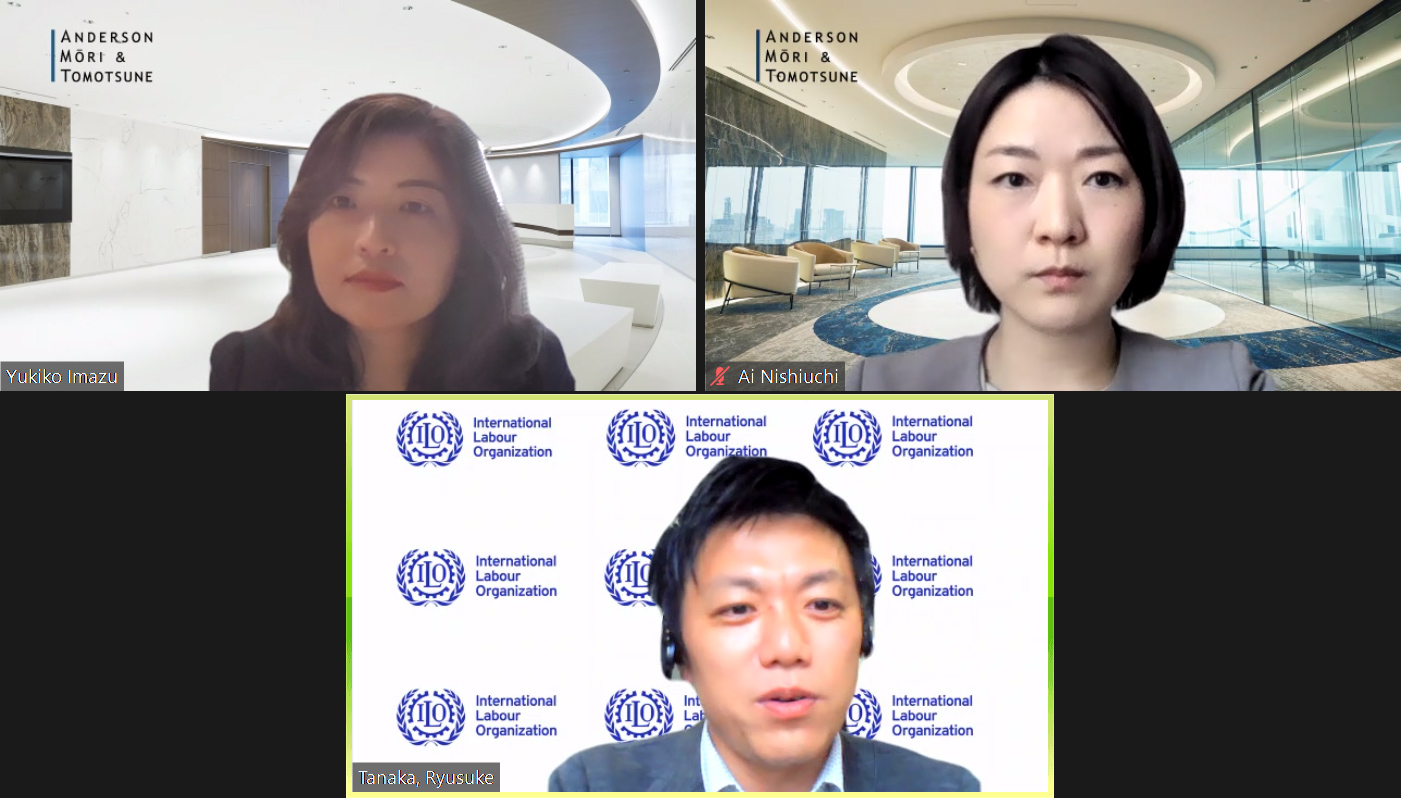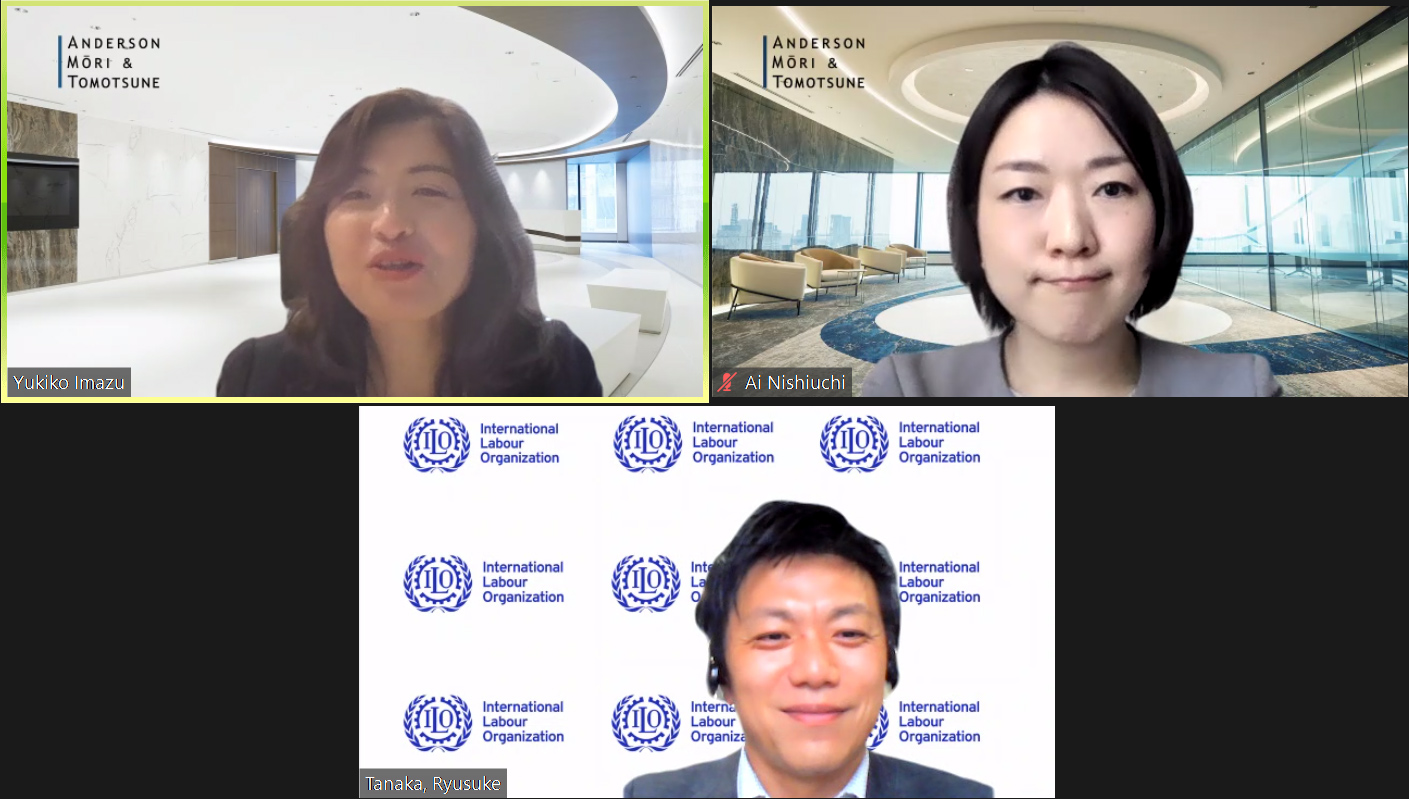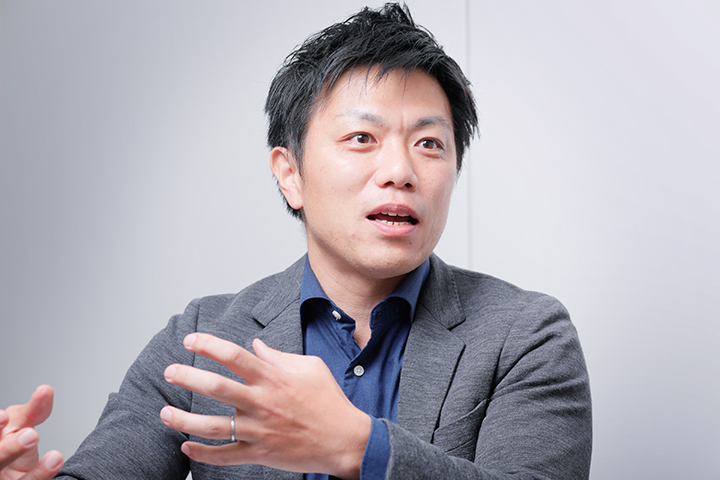Acting for Sustainability : A Legal Perspective
Feature #6 : Thinking through the Subject of Decent Work with Mr. Tanaka of the International Labour Organization (“ILO”)
(Interview with Ryusuke Tanaka at ILO Office for Japan, conducted by Yukiko Imazu, Partner at AMT, and Ai Nishiuchi, Associate at AMT)

| Issue | Jun 9, 2023 |
|---|

Lately, global-level issues and the UN’s 17 Sustainable Development Goals (SDGs) that indicate the goals for solving these issues have been drawing more attention. At Anderson Mōri & Tomotsune, we as legal professionals continue to look for ways to contribute to achieving these SDGs. Our lawyers have developed a wealth of SDG-related expertise in their respective fields and have put these resources at the disposal of our clients, helping them find best practice-based solutions to the many legal issues that attach to sustainable development.
In this special feature, we introduce some of the activities that have allowed our lawyers not only to commit our Firm to the UN’s SDGs, but also to position our Firm as a leader in the field of sustainability law.
For the sixth conversation in this feature series, we conduct an interview with Ryusuke Tanaka, Programme Officer at the ILO Office for Japan.
*Date of the interview: April 19, 2022, conducted online.
Feature #6 : Thinking through the Subject of Decent Work with Mr. Tanaka of the International Labour Organization (“ILO”)
(Interview with Ryusuke Tanaka at ILO Office for Japan, conducted by Yukiko Imazu, Partner at AMT, and Ai Nishiuchi, Associate at AMT)
Table of contents
Q1:What can we learn from the SDGs Goal 8, particularly the relationship between business and labour?
ImazuThank you for joining us today. I have been engaged in a labour law practice for many years, and I feel that the atmosphere has changed recently as the concept of “Decent Work” has begun to spread.
Mr. TanakaThank you for inviting me to this dialogue. I used to work as a lawyer practicing labour law. Since joining the ILO, I enjoyed valuable opportunities in exchanging views with government officials, engaging directly with stakeholders from practical perspectives and participating in global discussions in the field of law and beyond, including labour and socioeconomic policies.
NishiuchiToday’s topic is Goal 8 of the SDGs, particularly the relationship between business and work. Exactly, what is this goal about?
Mr. TanakaThe SDGs set 17 goals to maintain global and human sustainability from economic, social, and environmental perspectives. Some companies often struggle with how they can contribute to the goals. Companies may want to revisit the preamble to the SDGs, when discussing internally and with external stakeholders the way to pursue the objectives of the 17 individual goals. The preamble to the SDGs envisions “a better future for all people”, in other words “the future we want for 2030.” While respect for fundamental labour rights is a matter of primary importance, we should be mindful of “Decent Work for All” that appears in the preamble (2030 Agenda, Paragraph 9). The focus of this concept is “for All,” that is, securing jobs with dignity to all regardless of where they work or what they work for. This contributes to leave no one behind. There are diverse working conditions around the world, including those that are precarious and that place workers in vulnerable positions. In particular, migrant workers who work across borders are vulnerable. Economic globalization has made these vulnerable workers and the global production system inseparable. Our goal for 2030 should be to realize an inclusive society by supporting these vulnerable workers as our highest priority.
NishiuchiWhy is it important to protect vulnerable workers?
Mr. TanakaExtreme poverty and inequality are rampant around the world, especially among the vulnerable. Any further expansion of poverty and inequalities deteriorate the planet’s capacity to maintain its sustainability. Let’s imagine the excessive use of the natural resources that should be preserved for future generations and the situation of which have caused climate change threatening people’s limited livelihoods. The same may apply to social aspect. Poverty and inequality deteriorate the balance and stability of society, leading to conflicts and injustices that drive more vulnerable people into precarious situations. These circumstances arise in both developed and developing economies. Japan is not an exception. We can no longer sustain our planet without looking after the vulnerable and providing them with equal opportunities and decent work to end poverty and inequality.
From these perspectives, Goal 8 of the SDGs sets out “Decent Work.” The primary goals contained in Goal 8 are the elimination of forced labour, human trafficking, modern slavery, and child labour. Forced labour and child labour are serious violations of human rights and create a hotbed for poverty and inequality, and therefore must be eradicated. From an economic perspective, industries relying on exploitation of children and socially vulnerable people are no longer sustainable. Also, we can say that technological advances with value creation or innovation are only possible when they are supported by high-quality employment. In this way economic growth and decent work are closely linked. We can note that the SDGs highlight decent work in parallel with the goal of economic growth, and that economic growth must be “inclusive.” Towards realizing a society with no one left behind, both the government and the private sector have a role to play in creating decent work.
NishiuchiIn order to realize decent work, I assume it is necessary to think in terms of a middle to long- term perspective.
Mr. TanakaIndeed. I think that having a longer-term mindset is a key to working out the SDGs. The SDGs aim to achieve “sustainable” economic growth that goes beyond the pursuit of short-term economic benefits. In this context, it should not be regarded as sustainable business practices if one considers labour as merely a cost, discouraging investment in workers’ skills development that increases their employability, or imposing too much tasks that exceed the worker’s capability to fulfil the short-term business needs. Such practices would make it difficult to maintain highly productive and competent talents. In recent years, more investors have come to emphasize middle to long-term corporate growth, and more shareholders exercise their rights in favour of sustainability. The Government of Japan has decided to review the quarterly disclosure system to promote corporate growth over the long term. Companies, in turn, are beginning to consider the added value of labour over the middle to long-term. I think the time has come to recap the positive impacts on innovation brought about by workers and workers’ skills development, as well as on corporate growth in a middle to long-term perspective.
It might be taken for granted, but we should be reminded that creating high-quality jobs itself contributes to socioeconomic development of the country. For example, if a Japanese company runs a factory in Cambodia and hires workers, the wages earned by the workers will contribute to the tax pool and to consumption, which will eventually become a source of Cambodia’s socioeconomic development. Labour and the economy will both affect social policies of the country. Thinking like this could be a positive way to see the SDGs Goal 8.

Q2:The ILO’s efforts
NishiuchiWhat efforts has the ILO made in relation to achieving the SDGs?
Mr. TanakaCurrently, the ILO Office for Japan increasingly focuses on support to business. Companies are the main players in the market, and if they change their behavior, the market system will respond. If the market chooses to accommodate the values encapsulated in the SDGs’ concept of respect for human rights, this will eliminate companies that depend on forced or child labour.
In our activities at the ILO Office for Japan, we mostly work with industry associations or employers’ organizations rather than individual companies. The largest organization we work with in Japan is the Japan Business Federation (“Keidanren”). Recently, we have started working together with the Japan Textile Federation (“JTF”) and the Japan Electronics and Information Technology Industries Association (“JEITA”). When we collaborate with industry associations, we assist in developing sectoral guidelines that prompt businesses to respect human rights and that raise awareness among member companies. As the shortage of experts in the field of SDGs and “Business and Human Rights” is apparent, we are making efforts to help increase human resources, both inside and outside any given company, with advocating for the value and operation of the SDGs.
NishiuchiHow is the ILO’s relationship with the Japanese government?
Mr. TanakaThe government is the most important partner in achieving the SDGs. The ILO collaborates with the government in policymaking and engagement with the private sector. Based on past experience, I have provided technical input to the government in developing “Japan’s Guidelines on Respecting Human Rights in Responsible Supply Chains”, currently a work in progress by the Ministry of Economy, Trade and Industry (as of June 2022).
The ILO also cooperates with the government in public procurement policies. Public procurement, with proper legislative measures, can be a policy tool to create business incentives to the private sector. The “Sustainable Sourcing Code” of the Tokyo 2020 Olympic and Paralympic Games was a state-of-the-art initiative in Japan at that time. This is because the Code was formulated through dialogue with stakeholders and was based on global standards such as the ILO’s core labour standards and the ILO Tripartite Declaration of Principles concerning Multinational Enterprises and Social Policies (ILO MNE Declaration). This Code was widely referred to by the sponsor companies and thereby brought into play a number of positive practices related to decent work (see ILO’s brochure “Fair Play – Decent Work for All through the 2020 Games”). To pursue the SDGs in a localized context is what the ILO Japan aims for, and thus we wish to continue offering support to our partners in Japan for that purpose.
NishiuchiHow is the ILO’s relationship with the Ministry of Health, Labour and Welfare (“MHLW”)?
Mr. TanakaThe MHLW is the ILO Tokyo Office’s most important partner. Every year, we receive financial support from the MHLW in the form of assessed and voluntary contributions. Voluntary contributions are particularly used for ILO projects in Asia and the Pacific. When we look at the global supply chains in Asia that Japan benefits from economically, we see that there are many migrant workers who work in informal economy, putting them in a vulnerable position. In particular, female migrant workers work for lower wages and under more precarious conditions compared to male workers. With a view to improving this situation, the ILO is working with the MHLW on various projects to promote gender equality at workplace.
Within Japan, the ILO engages in intensive discussions with the MHLW and social partners on what policy reforms are necessary to address the precarious situation of migrant workers, most notably technical interns, and what specific actions should be taken based on the Japan’s National Action Plan on Business and Human Rights (formulated in 2020).
Q3:What companies must do to achieve Goal 8 of the SDGs?
NishiuchiWhat should the companies do to achieve Goal 8 of the SDGs?
Mr. TanakaFirst and foremost, companies should ensure that there are no human rights abuses in their business operations and should encourage their supply chain partners to do the same. This is because their business operations throughout the supply chains have an enormous impact on their respective society.
There are unstrained list of adverse impacts, potential or actual, on human rights that companies can cause. Among these are forced labour and similar exploitative practices, restricting a worker’s freedom by not paying decent wages, or by discriminating migrant workers. Companies should identify such adverse impacts in light of their business operations. But I understand that is not always so easy.
When they discover a situation of human rights abuses in their business partners, they are expected to take action in accordance with the “UN Guiding Principles on Business and Human Rights.” Given that a business partner is a separate legal entity, companies often have challenges in engaging with their partners. They can use the leverage, and sometimes can be better to choose to give an incentive for their business partner’s efforts to respect human rights, rather than resorting to sanctions in their business transactions. This is because coercion with penalties can lead to cover-ups of negative facts.
Depending on the industry, the closer you get to the source of the supply chain, the more likely you will find small companies with little financial stability, where workers are trapped in vulnerable situations with risking their lives in poverty. One way of hearing the voices of these people is to set up an operational level grievance mechanism extended throughout supply chains. At the very least, it should be followed up whether trade unions and workers’ representatives are properly handling workplace conflicts and grievances. It might work as a buyer to support its suppliers by suggesting possible concrete actions to address specific workplace issues.
A good practice found in a Japanese auto parts manufacturer in Thailand. It combined the QCD (Quality, Cost and Delivery) assurance process with an occupational safety and health check system so that communication concerning the working environment could be carried out jointly with those concerning the QCD. Such communication methods can create incentives for suppliers, and at the same time can bring benefits to workers who wish to work safely.
NishiuchiI assume there are various difficulties in actually checking for human rights violations.
Mr. TanakaYes, I have heard the cases from various places around the world. Generally, audits take place as part of a human rights due diligence, but allegedly one supplier can be required to undergo audits from multiple buyers conducted in an inconsistent manner. This causes audit fatigue. On the other hand, it is sometimes very difficult to do a compliance check by using the same auditing standards, particularly in labour intensive industries with factories all over the world.
In this regard, the ILO has a programme called Better Work which aims at improving the working environment at garment and sporting goods production factories through engagement and cooperation between workers and employers. Under this programme, a buyer company commits not to duplicate audits for factories that had already done it within the programme, so that a unified assessment is put in place that avoids audit fatigue. Better Work also provides process to check compliance with international labour standards and national labour laws, which can help fulfil requirements to respect human rights. Under the Better Work programme, assessment and improvement processes are implemented through engagement and cooperation between workers and employers. Workers’ ownership of the whole process is enhanced by asking them to elect members of a bipartite committee that takes lead of workplace communications and listens to the voices of individual workers. In the end, workers and employers agree action plans for better working environment, and this agreement can help increase the productivity level at the factory.
The audit results are disclosed on the programme website, which helps to increase transactions with buyers, especially European and American brands, and gives incentives to factories. I think that this way of sharing ownership between workers and employers to bring about continuous improvement is a very practical method that can be applied to other countries and manufacturing industries. The ILO is eager to consolidate such good practices and disseminate them among businesses.
NishiuchiThat sounds like a Win-Win method for both companies and workers. Moving on now, what are some of the “positive impacts” that corporations can have on society?
Mr. TanakaAdverse impacts are strongly inter-connected with positive impacts especially in the area of labour. In other words, adverse and positive impacts are sometimes the flip side of the coin. Taking an example from anti-harassment measures, positive impacts are often made through measures taken to tackle adverse impacts. In light of harassment prevention, carrying out role-play training, appointing workplace leaders to take actions, or setting up multiple consultation channels are the good examples of measures that help improve workplace communication. These measures, combined with “work style reform” measures, have a positive effect on both workers and employers at the same time (Reference: The Ministry of Health, Labour and Welfare - A good example of measures against power harassment in the workplace).
Among the various topics concerned with Business and Human Rights, the labour dimension has a distinctive nature in that the working condition is decided based on an agreement between employers and workers. The employment contract is agreed to avoid unhappy situations and build continuous relationships. When employers and workers aim to develop a sustainable relationship by improving mutual communication, by working for increased productivity, by eradicating harassment, by putting value in diversity, by increasing the number of female directors, or by prohibiting discrimination against foreigners, this will contribute to creating a diverse and inclusive workplace for everyone. Goal 8 of the SDGs seeks to realize “Decent Work” and economic growth without making trade-offs with each other, and the essence of this goal can be found in our routine efforts.

Q4:How do companies benefit by responding to the SDGs?
NishiuchiIn another closely related question, what are the benefits for companies that respond to the SDGs?
Mr. TanakaToday’s international community experiences rapid transformation. Particularly in Europe and the United States, there has been an irresistible wave towards the mandatory legislative measures to enforce the system to respect for human rights within businesses.
Businesses should adopt an immediate response to these circumstances, while bearing in mind that there are incoherent requirements and various political background considerations involved. As a member of a community or society, companies are expected, either by part of Business and Human Rights or SDGs, to proactively scale up their efforts to respond to social expectations from their stakeholders to address the challenges faced by society. In this way, companies can thrive by transforming and gaining business sustainability. If a pro-SDG behavior becomes common and well communicated among workers, those workers can help their company to respond to rapid transformations in a collective and consistent manner. If the workers are able to articulate a rationale of human rights protection in their external communications, this can have a ripple effect on the company’s business partners and stakeholders, and thereby society’s perceptions can be changed positively. By seizing the momentum in Europe and the US, one that witnesses a steep increase of social expectations for businesses’ respect for human rights, companies should start engagement and dialogue with stakeholders to respond to such social expectations, rather than simply reacting superficially to foreign legislation.
ImazuIf awareness of respect for human rights in European and American companies is increasing, it is natural that there will be an increase in inquiries for information from European and American companies about the working environment and the position of women when they choose Japanese companies as their business partners. I believe that it is important for the management of Japanese companies to become aware of this issue as soon as possible, and to clearly demonstrate their position on the importance of human rights in the labour market both inside and outside the company, and to put this into practice.
Mr. TanakaYes, exactly. I think active investors will soon start to incorporate the factor of working environment in their investment activities. In the electronics industry, expectations are high among investors because electronics components are produced and assembled worldwide, and the final products are sold around the world. In response, the Japan Electronics and Information Technology Industries Association (JEITA) was fairly quick to formulate sector-level guidelines based on higher standards. The ILO helped JEITA in this process.
On the other hand, a challenge in Japan seems to be an insufficient understanding of what human rights issues and abuses actually involves in the business. Whether it is knowingly or unknowingly, exploitation of migrant workers, discrimination based on social origin or gender, hate speech, harassment, the gender pay gap, excessive working hours, or unfair labour practices, all can be involved as human rights issues.
In the Trafficking in Persons Report published by the US Department of State, Japan is no longer ranked in the top layer but in the second tier, and this has been the case for several years. We cannot look away from the reality that Japan’s labour practices for migrant workers have been questioned. I reiterate the vulnerable status of the people working across borders. They are exploited at the very edge of the supply chains by human trafficking and forced labour schemes, where these workers have become invisible to society. I think it is important to face this reality and to be able to account for the human rights issues existing in Japan and elsewhere.
NishiuchiIn reality, I think there are quite a few companies that have thought of foreign workers as just cheap labour, so we need to change our way of thinking.
Q5:Future efforts
NishiuchiWhat efforts will the ILO make in the future?
Mr. TanakaThere are many challenges that need our urgent actions and efforts. Among others, we should focus on promoting uptake of business respect for human rights. Recently we have seen Japanese companies become more aware of the risks of human rights abuses in their operations. Sometimes the term “human rights” is taken too sensitively, but human rights have universal value and should be protected and respected equally everywhere in the world. That is why companies should look at international instruments, i.e., the UN Guiding Principles in addition to domestic legal rules. Now, we expect Japanese businesses to recognize that in the society they are coexisting with stakeholders and share with them responsibility to address human rights issues. Businesses will not be able to fulfil the needs of their stakeholders simply by complying with the laws and regulations of their own country. Stakeholders demand respect for internationally recognized human rights, in addition to complying with domestic laws and regulations, as a precondition for their coexistence in the same society. Respect for human rights is a matter of dignity of individuals. We would strive towards changes that help companies understand that human rights are a matter of individual dignity, not just an issue of legal compliance, and that they must seek to better coexistence with the society that they are connected through their business.
When talking about “risks,” companies tend to think about management risks. But to avoid leaving vulnerable workers behind needs a change of mindset that “risk” is already embedded in the society within which they operate. From a global perspective, leading managers are “attentive” in identifying adverse impacts on marginalized people and giving due care to them. I think companies need to shift their mindset from conventional business risks towards the risk of adverse impacts that they have on human rights and other interest of stakeholders. This business respect for human rights requires further efforts to be made also in the public sector. In particular more commitment should be given to international standards by national governments.
Finally, legal professionals have a role to play. We would expect them to help ensure that internationally recognized human rights, international labour standards, and “Decent Work” are more often referred to in the judicial precedents. I believe that adjudication should have the function of guiding the social norms in the right direction to pursue the protection of human rights. I have to admit that I myself was not aware of the need to cite international norms in court arguments, but there are still few citations of international human rights and international labour standards in domestic court cases. In light of Japan’s position in current diplomatic relations, legal professionals can navigate the social integration of the international human rights treaties agreed upon by the international community and help achieve the purpose of the treaties within Japan’s legal framework through their activities in the judicial system. In this sense, “Decent Work” is a universal value, and if it becomes a part of the relevant case law in Japan, it can contribute to building a society fully based on the standards of internationally recognized human rights.
ImazuIn other words, maybe it is easier to understand the concept of “Decent Work” when it comes to “respect for individuals” rather than “human rights,” if I understand correctly.
In any case, we will strive to concretize and clarify the content of “Decent Work,” and will work hard to ensure that the concept of “Decent Work” is used as a standard of justice. Thank you for your valuable talk today.

Ryusuke Tanaka





